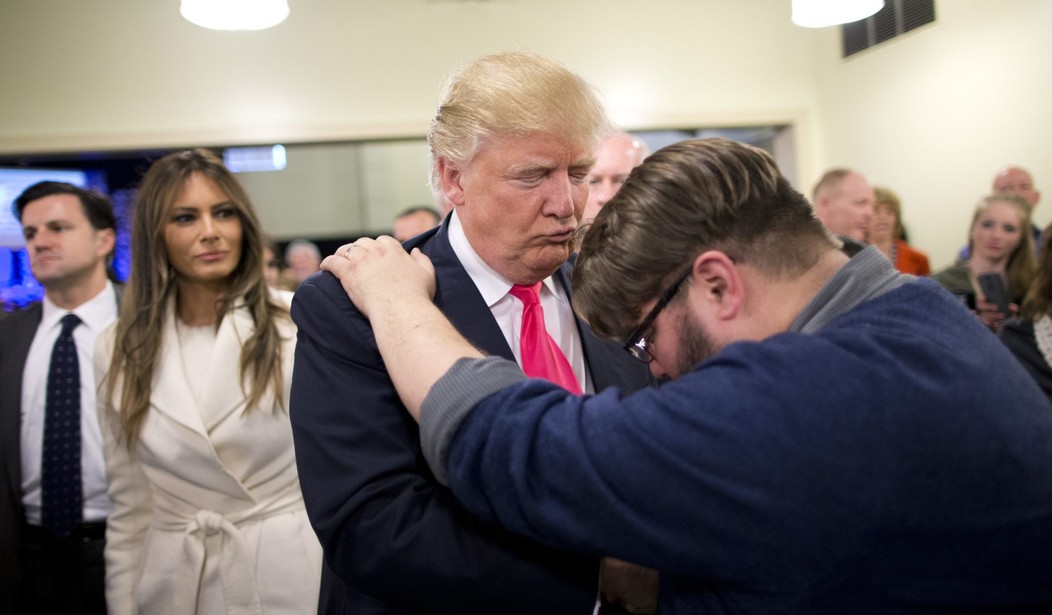Just how evangelical are evangelicals, really? According to a recent survey from LifeWay Research, not very. Less than half of those who self-identify as “evangelical” or as “born again” actually have evangelical beliefs. At a time when the evangelical community is wrestling amongst itself over Donald Trump and other hot-button issues, it is important to recognize that not all self-described evangelicals are true believers.
“There’s a gap between who evangelicals say they are and what they believe,” Scott McConnell, executive director of LifeWay Research, said in a statement.
LifeWay asked Americans whether they identified as evangelical, whether they would identify as evangelical if the word didn’t have political connotations, and whether they identified as “born again.” More African-Americans identified as “born again,” but even that label did not predict whether or not people had evangelical beliefs.
Only 45 percent of self-identified evangelicals held those beliefs. Only 43 percent of those who identified as evangelical apart from politics did so, and only 45 percent of those who said they were “born again” had evangelical beliefs.
Among those who did have evangelical beliefs, only 69 percent considered themselves evangelical and only 68 percent said they would consider themselves evangelical apart from politics. A full 83 percent considered themselves “born again.”
Overall, 24 percent of Americans considered themselves evangelical, 25 percent considered themselves evangelical sans politics, and 29 percent considered themselves “born again” Christians. Only 15 percent had evangelical beliefs, however.
The LifeWay survey revealed some other interesting facts about which Americans embrace these labels. Perhaps unsurprisingly, African-Americans were more likely to identify as “born again” than as “evangelical,” a term often associated with whiteness. Almost half of black Americans in the survey (49 percent) identified as “born again,” while only 27 percent of whites did so, along with 24 percent of Hispanics.
Americans holding evangelical beliefs were more racially diverse than those identifying as evangelical, with or without the political implications. Nearly a quarter (23 percent) of those with such beliefs were black, while only 14 percent of those identifying as evangelical were black. White Christians looking to reach out to their black brothers and sisters could make more inroads by describing themselves as “born again,” rather than evangelical.
Those with evangelical beliefs were more likely (73 percent) to attend church once a week or more, compared to self-identified evangelicals (61 percent) and those who identify as “born again” (56 percent).
While ethnicity proved to be a good predictor of whether or not someone identified as evangelical, politics had much less of an impact.
Nearly two-thirds (65 percent) of Americans who had evangelical beliefs were Republican or leaned Republican, while only 30 percent were Democrat or leaned in that direction. Perhaps surprisingly, fewer self-identified evangelicals were Republican (64 percent) and more were Democrat (33 percent). Those numbers barely changed when politics was taken out of the evangelical label.
The “born again” label also skewed more Republican (56 percent) than Democratic (39 percent), but it proved more inclusive.
From the survey, it seemed few Americans with evangelical beliefs shun the evangelical label for political reasons, despite the 2016 election results, when Donald Trump won 81 percent of the evangelical vote.
“Evangelical religious beliefs by themselves do not explain political behavior,” McConnell, the LifeWay executive director, explained. “Ethnic group is a better predictor of political behavior, but the best predictor of voting patterns is one’s political party identification.”
The more education Americans have, the less likely they are to identify as evangelical or have evangelical beliefs, according to the survey. LifeWay found that a quarter of Americans with a high school diploma or less (26 percent) or some college (28 percent) identified as evangelicals, while 18 percent of those with a bachelor’s degree did so.
Americans with some college (20 percent) were more likely to have evangelical beliefs than those with a bachelor’s degree (9 percent) or a graduate degree (12 percent).
While the survey’s results proved eye-opening, some might ask how LifeWay determined who is “evangelical by belief.” LifeWay partnered with the National Association of Evangelicals (NAE) to craft the definition. The two agreed that, to be considered an evangelical by belief, an American must “strongly agree” with four statements:
The Bible is the highest authority for what I believe.
It is very important for me personally to encourage non-Christians to trust Jesus Christ as their Savior.
Jesus Christ’s death on the cross is the only sacrifice that could remove the penalty of my sin.
Only those who trust in Jesus Christ alone as their Savior receive God’s free gift of eternal salvation.
Most Christians should agree with all four statements, as they are directly biblical. The first two may overemphasize the point, however. There are many evangelical Roman Catholics, and the Catholic Church holds scripture on par with tradition in terms of belief. Furthermore, while all Christians are called to preach the gospel (Matthew 28:19), the language “it is very important for me personally” seems needlessly insistent. LifeWay did not say how many people “agreed” with the second statement, rather than “strongly agreeing” with it.
Throughout the gospels, Jesus calls believers into a radical form of discipleship far beyond the lifestyle of most self-identified Christians. It is hard for LifeWay and NAE to adopt a quick definition to identify true disciples, and their definition mostly holds water.
In light of this, it is indeed concerning that less than half of self-identified evangelicals and “born again” Christians actually hold evangelical beliefs. Jesus commanded His followers to “make disciples of all nations,” and it seems American Christians must consider their fellow “born again Christians” and “evangelicals” part of that mission field.
After all, Jesus Himself taught that there would be false prophets (Matthew 24:11), that He would separate “the sheep and the goats” (Matthew 25:32-46), and that many will call Him “Lord, Lord,” but not be saved (Matthew 7:21-23).
In light of this, it is important to take the “evangelical” label with a grain of salt, and for Christians to preach the gospel to everyone, even those who might believe it already.









Join the conversation as a VIP Member